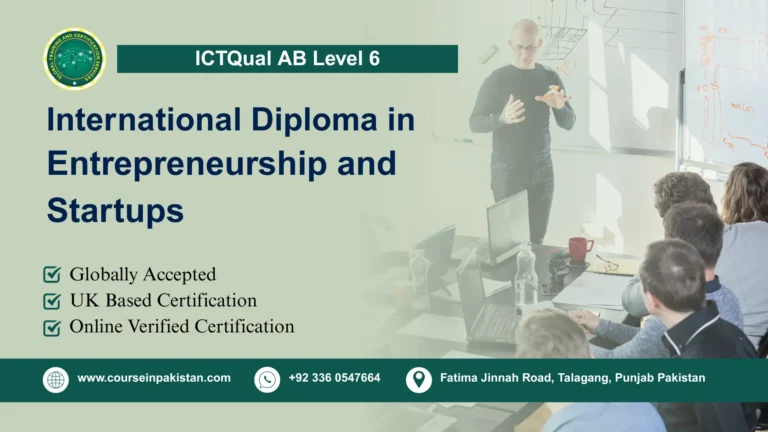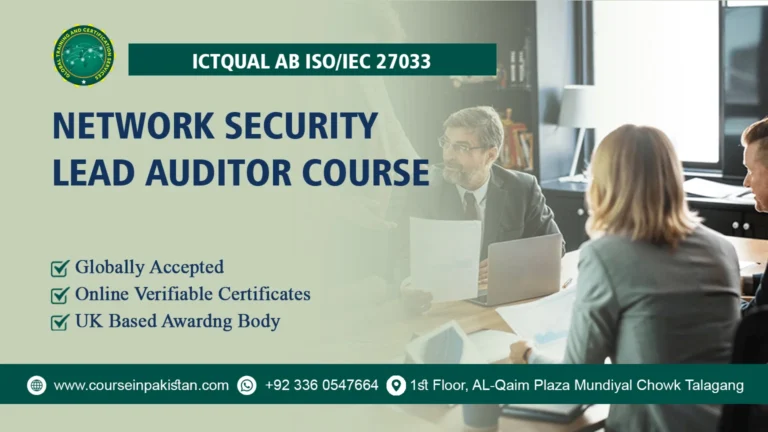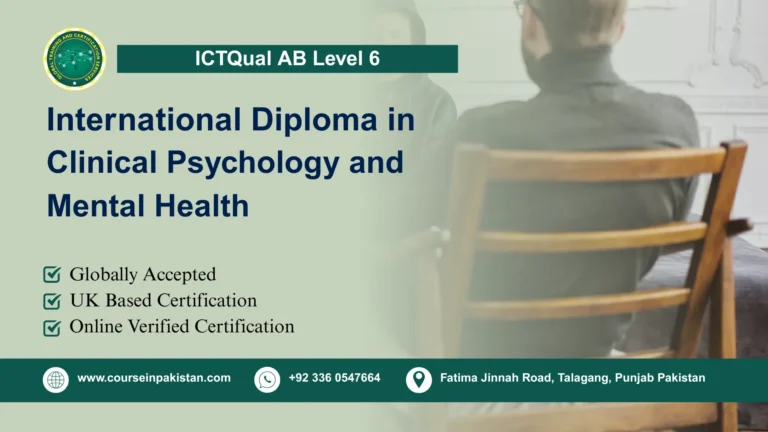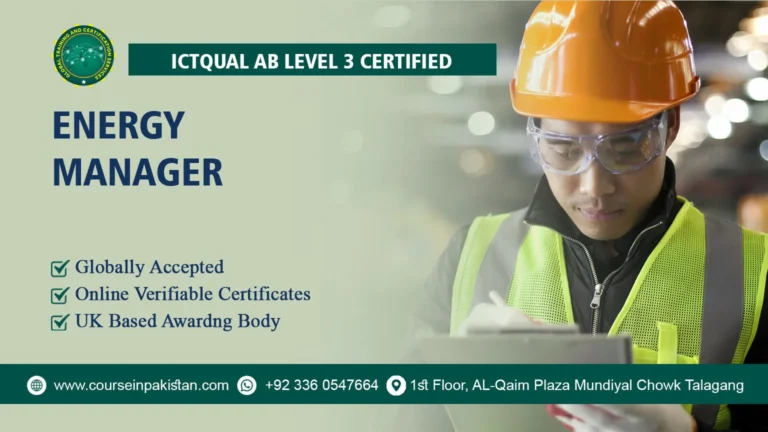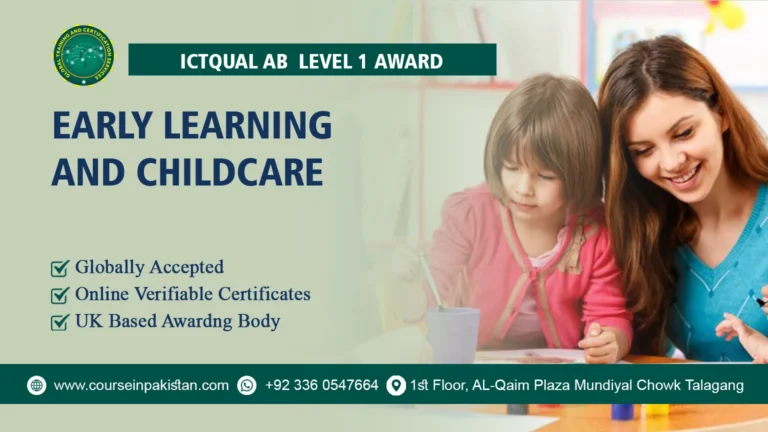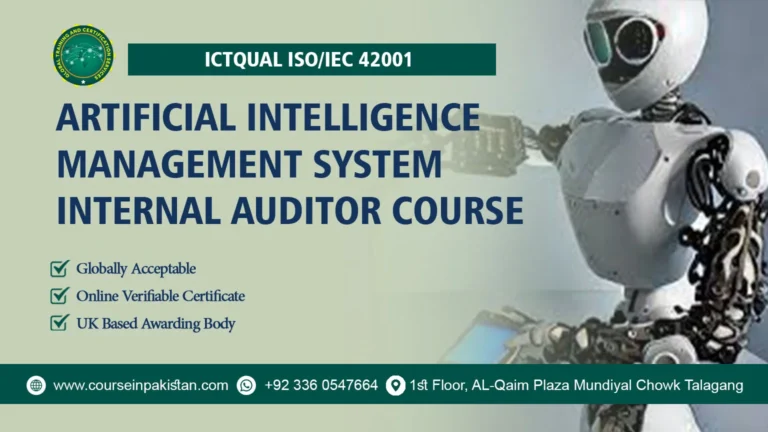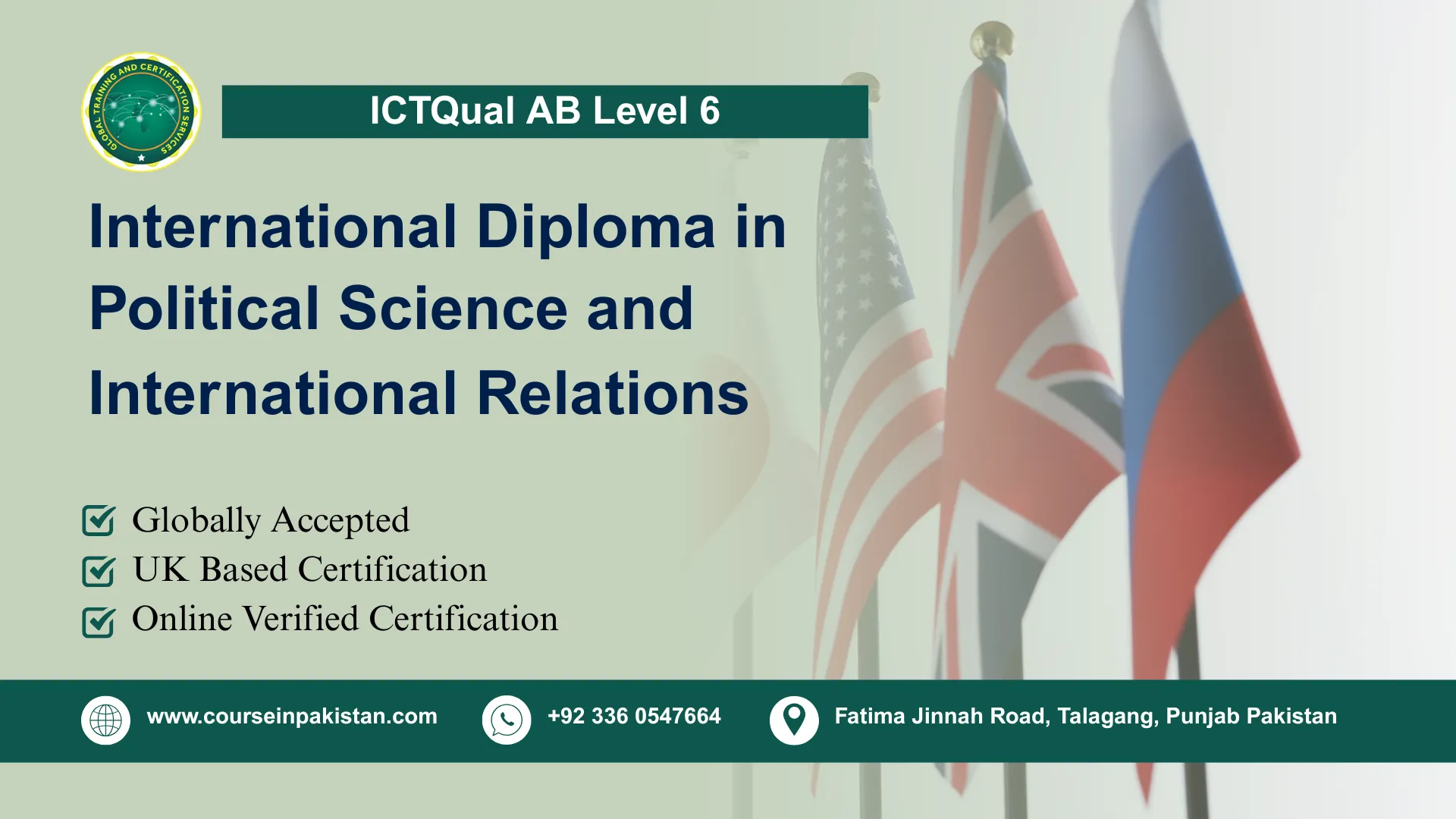
The ICTQual AB Level 6 International Diploma in Political Science and International Relations provides a comprehensive foundation in global politics, governance, and diplomatic practices. This course equips learners with critical analytical, research, and decision-making skills to understand complex political systems and international relations. Learners gain insights into policy-making, strategic leadership, global security, and the dynamics of international organizations.
The program is structured to develop both theoretical knowledge and practical skills. It covers political theories, global governance, diplomacy, conflict resolution, and contemporary issues in international relations. Whether you are starting your career or seeking to formalize your experience in politics or diplomacy, this diploma enhances professional competence and prepares you for advanced roles in government, international agencies, NGOs, or research institutions.
Course Overview
The ICTQual AB Level 6 International Diploma in Political Science and International Relations is a 360-credit, fully assignment-based program that allows learners to study at their own pace from anywhere in the world. The qualification is verified by the British Council and attested by MOFA and Embassies, ensuring global recognition, career advancement, and iqama approval.
This program suits both fresh graduates and experienced professionals. Fresh students must complete all 36 mandatory assignments within three years. Experienced professionals with at least 6 years of relevant verifiable experience can fast-track their certification by demonstrating their knowledge in professional discussion meetings with an ICTQual AB Approved assessor, bypassing full assignment completion.
The course ensures flexibility, practical learning, and internationally recognized credentials for individuals pursuing careers in political analysis, diplomacy, policy advisory, and governance.
Key Highlights of the Course:
- 360-credit, fully assignment-based program with flexible, self-paced study.
- British Council verifiable, MOFA and Embassy attested for global recognition.
- Covers political theory, international relations, diplomacy, conflict resolution, and global governance.
- Suitable for fresh graduates and experienced professionals seeking certification or fast-track recognition.
- Enhances career prospects in government, NGOs, policy analysis, and international organizations with iqama approval.
Course Benefits
Global Recognition and Credibility
- British Council verification and MOFA/Embassy attestation provide internationally recognized credentials.
- Enhances professional credibility for employment and career growth worldwide.
Flexible Learning and Accessibility
- Fully assignment-based structure allows learners to progress at their own pace.
- Study from anywhere in the world, ideal for working professionals and remote learners.
Comprehensive Political and Diplomatic Knowledge
- Covers political theories, global politics, international law, diplomacy, and governance.
- Develops analytical, research, and decision-making skills essential for political careers.
Career Advancement Opportunities
- Prepares learners for roles such as political analyst, diplomat, policy advisor, international relations consultant, and governance officer.
- Supports professional growth with iqama approval and globally recognized certification.
Practical and Professional Application
- Encourages application of political science and international relations in real-world scenarios.
- Equips learners to handle complex global challenges, policy development, and strategic decision-making.
Course Study Units
This qualification, the ICTQual AB Level 6 International Diploma in Political Science & International Relations, consists of 36 mandatory units.
Year 1 – Foundation in Political Science & International Relations
- Introduction to Political Science
- Foundations of International Relations
- Comparative Politics and Government Systems
- Political Ideologies and Theories
- History of Political Thought
- Principles of Public Administration
- Introduction to International Organisations
- Global History and World Politics
- Political Communication and Media Studies
- Research Methods in Political Science
- Human Rights and Social Justice
- Introduction to Diplomacy and Foreign Policy
Year 2 – Intermediate Political Science & International Relations
- Advanced Political Theory and Analysis
- International Law and Global Governance
- Political Economy and Development Studies
- Regional Studies: Europe, Asia, Africa, and the Middle East
- Conflict Resolution and Peace Studies
- Political Sociology and Social Movements
- Policy-Making and Public Policy Analysis
- International Political Economy
- Comparative Foreign Policy
- Security Studies and Global Challenges
- Research Methods and Data Analysis in Politics
- Ethics and Professional Practice in Political Science
Year 3 – Advanced Political Science & International Relations
- Contemporary Issues in International Relations
- Strategic Studies and National Security
- International Diplomacy and Negotiation
- Policy Analysis and Political Reform
- Globalisation and Transnational Politics
- Leadership and Governance in Political Institutions
- International Conflict and Crisis Management
- Political Risk Analysis and Strategic Decision-Making
- Environmental Politics and Global Sustainability
- International Cooperation and Development Projects
- Innovation and Emerging Trends in Global Politics
- Capstone Project in Political Science & International Relations
Learning Outcomes
Year 1 – Foundation in Political Science & International Relations
1. Introduction to Political Science
- Understand fundamental political concepts, structures, and processes.
- Explain the role of government and political institutions in society.
2. Foundations of International Relations
- Identify key actors and principles in global politics.
- Explain major theories and approaches in international relations.
3. Comparative Politics and Government Systems
- Compare different political systems and governance models.
- Analyze political stability, power distribution, and institutional effectiveness.
4. Political Ideologies and Theories
- Evaluate major political ideologies and their historical significance.
- Analyze their influence on contemporary political systems.
5. History of Political Thought
- Trace the evolution of political ideas from classical to modern times.
- Examine contributions of key thinkers to political philosophy.
6. Principles of Public Administration
- Apply concepts of administration, governance, and bureaucratic structures.
- Understand the role of public institutions in policy implementation.
7. Introduction to International Organisations
- Identify the functions and roles of organizations like the UN and WTO.
- Explain their impact on international policy and diplomacy.
8. Global History and World Politics
- Analyze significant historical events and their political impact.
- Examine how historical developments shape modern international relations.
9. Political Communication and Media Studies
- Understand the influence of media on political processes.
- Evaluate communication strategies used by governments and organizations.
10. Research Methods in Political Science
- Develop foundational research skills for political analysis.
- Understand qualitative and quantitative methods in political studies.
11. Human Rights and Social Justice
- Comprehend key human rights principles and legal frameworks.
- Analyze social justice issues and their impact on governance.
12. Introduction to Diplomacy and Foreign Policy
- Explain the fundamentals of diplomatic practices and foreign policy.
- Understand the interaction between states in international relations.
Year 2 – Intermediate Political Science & International Relations
13. Advanced Political Theory and Analysis
- Critically analyze complex political theories and frameworks.
- Apply theoretical perspectives to contemporary political issues.
14. International Law and Global Governance
- Understand the principles of international law.
- Apply legal frameworks to global governance and dispute resolution.
15. Political Economy and Development Studies
- Examine the relationship between politics and economic policies.
- Analyze development challenges in various political contexts.
16. Regional Studies: Europe, Asia, Africa, and the Middle East
- Understand political structures and dynamics in different regions.
- Compare regional policies, conflicts, and governance models.
17. Conflict Resolution and Peace Studies
- Apply methods for resolving local and international conflicts.
- Assess strategies for promoting peace and security.
18. Political Sociology and Social Movements
- Analyze the role of society and social movements in political change.
- Evaluate the impact of collective action on governance and policy.
19. Policy-Making and Public Policy Analysis
- Understand the policy-making process and implementation challenges.
- Critically evaluate policy effectiveness and outcomes.
20. International Political Economy
- Examine the global economic system and its political implications.
- Analyze trade, finance, and development policies at the international level.
21. Comparative Foreign Policy
- Compare foreign policy strategies of different countries.
- Evaluate the impact of historical, economic, and political factors on foreign relations.
22. Security Studies and Global Challenges
- Identify key threats to national and international security.
- Develop strategies for mitigating security risks and global challenges.
23. Research Methods and Data Analysis in Politics
- Conduct advanced research using political data and statistics.
- Interpret results to support evidence-based political conclusions.
24. Ethics and Professional Practice in Political Science
- Apply ethical principles in research and professional practice.
- Evaluate dilemmas and decision-making in political and governance contexts.
Year 3 – Advanced Political Science & International Relations
25. Contemporary Issues in International Relations
- Analyze current global political challenges and trends.
- Evaluate international responses to crises and conflicts.
26. Strategic Studies and National Security
- Develop strategies for national security and defense.
- Assess threats and policy responses at national and international levels.
27. International Diplomacy and Negotiation
- Apply negotiation and diplomatic skills in global settings.
- Design strategies for conflict resolution and international cooperation.
28. Policy Analysis and Political Reform
- Evaluate policy frameworks and propose reforms.
- Apply critical thinking to improve governance systems.
29. Globalisation and Transnational Politics
- Assess the effects of globalization on politics and society.
- Understand transnational governance and international collaboration.
30. Leadership and Governance in Political Institutions
- Demonstrate leadership skills in political and administrative contexts.
- Apply governance strategies to enhance institutional effectiveness.
31. International Conflict and Crisis Management
- Develop strategies for managing international conflicts and crises.
- Evaluate best practices in crisis prevention and resolution.
32. Political Risk Analysis and Strategic Decision-Making
- Conduct political risk assessments for organizations and governments.
- Apply decision-making models under uncertainty and complexity.
33. Environmental Politics and Global Sustainability
- Analyze political responses to environmental challenges.
- Evaluate policies promoting sustainability and climate action.
34. International Cooperation and Development Projects
- Plan and implement international collaboration projects.
- Assess project outcomes and policy implications in global contexts.
35. Innovation and Emerging Trends in Global Politics
- Identify and analyze emerging trends in political systems and governance.
- Apply innovative strategies to solve global political challenges.
36. Capstone Project in Political Science & International Relations
- Apply comprehensive knowledge from the program to a real-world or policy-based project.
- Demonstrate research, analytical, and strategic decision-making skills.
Who is This Course For?
Aspiring Political Analysts and Diplomats
- Individuals aiming to develop a deep understanding of global politics, governance, and international relations.
- Professionals seeking careers in embassies, foreign services, or international organizations.
Policy and Governance Enthusiasts
- Learners interested in public policy, political reform, and strategic decision-making.
- Individuals looking to work in governmental or non-governmental policy advisory roles.
Research-Oriented Professionals
- Students who wish to conduct advanced political research and analysis.
- Those aiming to develop expertise in policy evaluation, risk assessment, and evidence-based decision-making.
Global Affairs and Security Specialists
- Professionals interested in conflict resolution, crisis management, and global security studies.
- Learners looking to engage with international diplomacy, negotiation, and transnational politics.
Future Progression
- Pursue senior roles in governmental institutions, embassies, and diplomatic missions.
- Develop a career in international organizations, think tanks, and policy advisory bodies.
- Engage in political consultancy, strategic analysis, and political risk assessment.
- Progress to academic research or teaching roles in political science and international relations.
- Work as a global affairs analyst, international project manager, or development officer.
Academic Pathways:
- Advanced studies at the Master’s level in Political Science, International Relations, or Global Governance.
- Specialization in Diplomacy, Security Studies, or International Development.
- Postgraduate research opportunities in comparative politics, political theory, or international law.
- Professional certifications in policy analysis, negotiation, or conflict resolution
Conclusion
The ICTQual AB Level 6 International Diploma in Political Science & International Relations equips learners with comprehensive knowledge of political systems, global affairs, and governance practices. Designed for both fresh and experienced candidates, this 360-credit assignment-based qualification allows learners to study at their own pace from anywhere in the world. Fresh students complete all mandatory assignments within three years, while experienced professionals can achieve the diploma faster through verification of relevant experience and professional discussion. Graduates emerge as competent political analysts, diplomats, policy advisors, and global affairs specialists ready to excel in a rapidly changing international environment.

